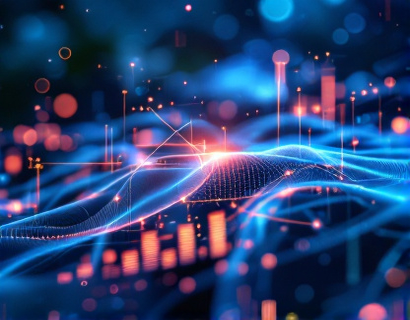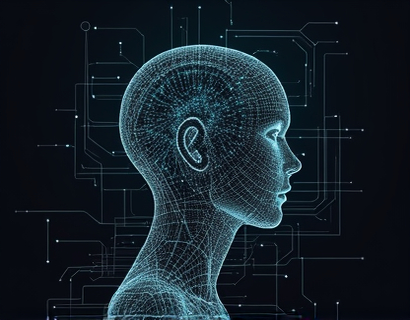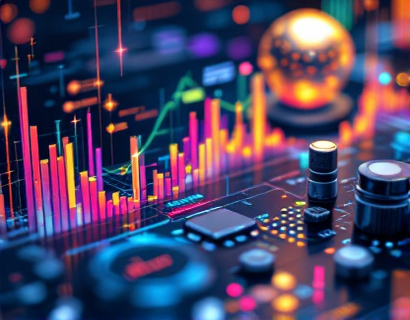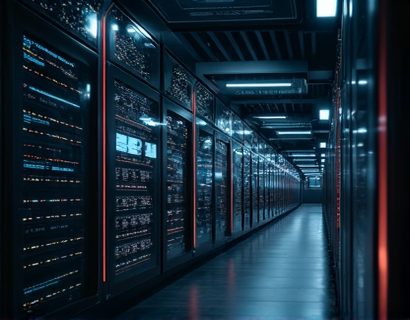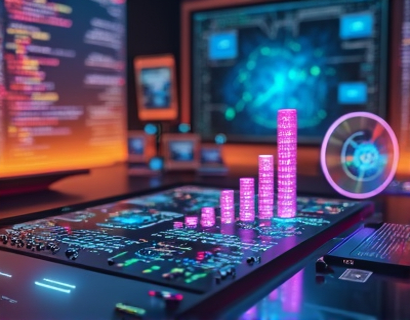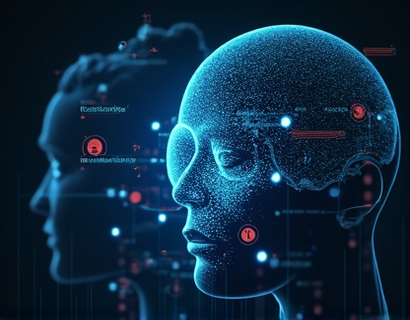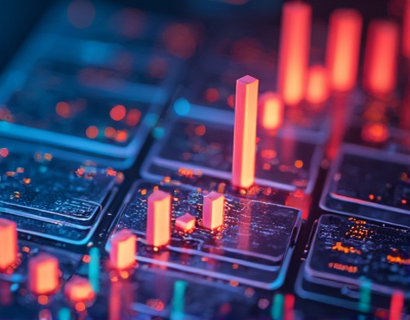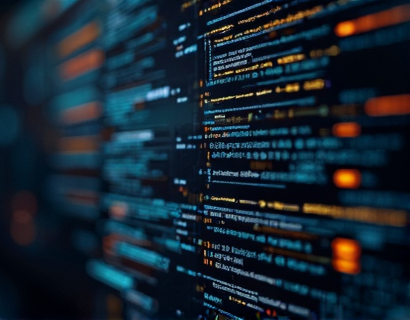AI and Crypto Convergence: Revolutionizing Blockchain Finance with Intelligent Solutions
The intersection of artificial intelligence (AI) and cryptocurrency is ushering in a new era of innovation in the finance and tech sectors. This convergence is not just a technological advancement but a transformative shift that is redefining how we perceive and interact with blockchain finance. The synergy between AI and cryptocurrency is creating intelligent solutions that enhance security, efficiency, and accessibility in the digital currency space. This article delves into the dynamic relationship between AI and crypto, exploring the latest developments, expert insights, and the vibrant community driving this revolution.
Understanding the Basics
To grasp the full potential of AI and crypto convergence, it's essential to understand the fundamental concepts of both technologies. Artificial intelligence, a branch of computer science, involves the development of algorithms and systems that can perform tasks requiring human intelligence, such as learning, reasoning, and self-correction. On the other hand, cryptocurrency, particularly blockchain technology, is a decentralized digital ledger that records transactions across multiple computers in a way that ensures security, transparency, and immutability.
The integration of AI into blockchain technology leverages the strengths of both fields. AI can process vast amounts of data, identify patterns, and make predictions, while blockchain provides a secure and transparent platform for executing and verifying transactions. This combination opens up numerous possibilities for enhancing various aspects of blockchain finance.
Enhancing Security with AI
One of the most significant benefits of AI in blockchain finance is the enhancement of security measures. Traditional blockchain systems rely on cryptographic algorithms to secure transactions, but they are not immune to attacks. AI can significantly bolster security by detecting and mitigating threats in real-time.
Machine learning algorithms can analyze transaction patterns and identify anomalies that may indicate fraudulent activity. For instance, AI can monitor blockchain networks for unusual spikes in transaction volumes or unexpected transfers to unknown addresses. By flagging these anomalies, AI systems can alert network participants and automate the process of isolating and neutralizing threats.
Moreover, AI can improve the security of smart contracts, which are self-executing contracts with the terms directly written into code. AI tools can scan smart contracts for vulnerabilities and potential bugs, ensuring that they function as intended and reducing the risk of exploits. This proactive approach to security is crucial in a decentralized environment where trust is paramount.
Optimizing Blockchain Performance
Blockchain technology, while revolutionary, faces challenges related to scalability and efficiency. Transaction processing times and fees can be prohibitive, limiting widespread adoption. AI can play a pivotal role in optimizing blockchain performance by streamlining operations and enhancing resource management.
AI algorithms can optimize block validation and transaction processing by predicting network congestion and adjusting parameters accordingly. For example, AI can dynamically adjust block sizes and transaction fees based on real-time network conditions, ensuring smoother and faster transaction processing. This adaptive approach can significantly reduce latency and lower costs, making blockchain more accessible and user-friendly.
Additionally, AI can enhance the efficiency of consensus mechanisms, which are critical for maintaining the integrity of the blockchain. By analyzing network data, AI can identify the most efficient consensus algorithms for specific use cases, reducing energy consumption and increasing transaction throughput. This optimization is particularly important for public blockchains like Bitcoin and Ethereum, which are striving to balance security, decentralization, and scalability.
Improving User Experience
The complexity of blockchain technology can be a barrier to entry for many users. AI can bridge this gap by creating more intuitive and user-friendly interfaces. Natural Language Processing (NLP) and machine learning can power chatbots and virtual assistants that guide users through the process of buying, selling, and managing cryptocurrencies.
These AI-driven interfaces can provide personalized recommendations based on user behavior and preferences, making the crypto experience more seamless and enjoyable. For instance, an AI assistant can suggest optimal times to buy or sell based on market trends, or provide detailed explanations of complex blockchain concepts in simple terms. This level of personalization enhances user engagement and fosters a more inclusive crypto community.
Fraud Detection and Compliance
Fraud and regulatory compliance are significant concerns in the crypto space. AI can significantly mitigate these risks by implementing advanced monitoring and reporting systems. Machine learning models can analyze transaction data to detect suspicious activities such as money laundering, tax evasion, and market manipulation.
Regulatory bodies can leverage AI to enforce compliance more effectively. AI tools can monitor transactions and identify potential violations of anti-money laundering (AML) and know-your-customer (KYC) regulations. This proactive approach not only protects investors and consumers but also helps maintain the integrity of the financial system.
Moreover, AI can assist in the creation of compliance frameworks tailored to specific jurisdictions. By understanding the nuances of different regulatory environments, AI can help crypto platforms adapt their operations to meet local requirements, facilitating broader adoption and reducing legal risks.
Predictive Analytics and Market Insights
One of the most exciting applications of AI in blockchain finance is predictive analytics. By analyzing historical data and real-time market conditions, AI can generate insights that help investors make informed decisions. Predictive models can forecast price movements, identify emerging trends, and assess the impact of various factors on cryptocurrency values.
These insights are invaluable for traders and investors looking to maximize returns and minimize risks. AI-driven platforms can provide real-time market analysis, alerting users to potential opportunities or threats. This level of predictive capability is transforming the way people approach crypto investing, turning it into a more data-driven and strategic endeavor.
Decentralized Finance (DeFi) Innovations
Decentralized Finance (DeFi) is a rapidly growing sector within the crypto ecosystem, and AI is playing a crucial role in its evolution. AI-powered DeFi platforms can offer more sophisticated and efficient financial services, such as lending, borrowing, and yield farming.
For example, AI can optimize lending algorithms to assess creditworthiness more accurately, reducing the risk of default and improving loan outcomes. AI-driven risk management systems can dynamically adjust interest rates and loan terms based on real-time market data, ensuring fair and adaptive financial services.
Yield farming, a strategy where users lend or stake cryptocurrencies to earn rewards, can be enhanced with AI by identifying the most profitable opportunities and automating the process. AI can analyze multiple DeFi protocols and recommend the best strategies for maximizing returns, making this complex process accessible to a broader audience.
Challenges and Considerations
While the convergence of AI and crypto offers numerous benefits, it also presents challenges that need to be addressed. One of the primary concerns is the ethical use of AI in finance. Ensuring that AI systems are transparent, fair, and free from bias is crucial to maintaining trust and preventing misuse.
Another challenge is the regulatory landscape. As AI and crypto continue to evolve, regulators are grappling with how to oversee these technologies effectively. Striking the right balance between innovation and regulation is essential to fostering a healthy and sustainable ecosystem.
Technical challenges, such as the computational resources required for AI algorithms, also need to be considered. Blockchain networks, particularly those using proof-of-work consensus mechanisms, consume significant energy. Integrating AI without exacerbating environmental concerns requires innovative solutions and a commitment to sustainability.
The Future of AI and Crypto
The future of AI and crypto convergence is bright, with endless possibilities for innovation and growth. As technology advances, we can expect to see even more sophisticated applications of AI in blockchain finance. The integration of AI with other emerging technologies, such as quantum computing and the Internet of Things (IoT), will further enhance the capabilities of decentralized systems.
The vibrant community of tech enthusiasts and professionals is driving this revolution forward. Forums, conferences, and online platforms are fostering collaboration and knowledge sharing, accelerating the development of intelligent solutions. Engaging with this community can provide valuable insights and opportunities for those interested in the AI and crypto space.
In conclusion, the convergence of AI and cryptocurrency is transforming the landscape of blockchain finance. By enhancing security, optimizing performance, improving user experience, and enabling predictive analytics, AI is unlocking new potentials in the digital currency world. As this field continues to evolve, it promises to bring about a more secure, efficient, and inclusive financial ecosystem.




